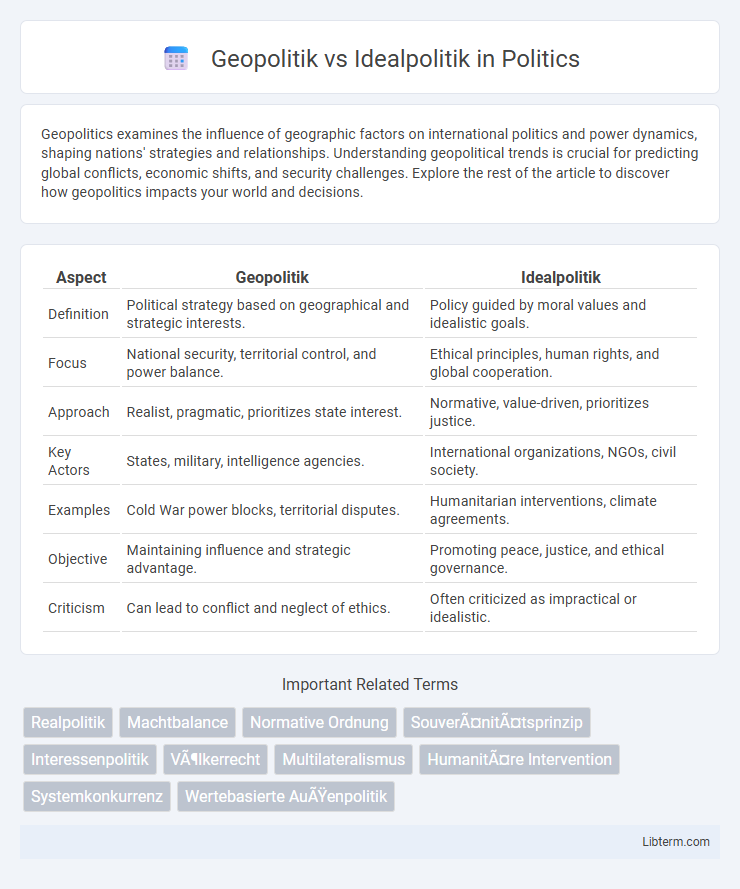Geopolitics examines the influence of geographic factors on international politics and power dynamics, shaping nations' strategies and relationships. Understanding geopolitical trends is crucial for predicting global conflicts, economic shifts, and security challenges. Explore the rest of the article to discover how geopolitics impacts your world and decisions.
Table of Comparison
| Aspect | Geopolitik | Idealpolitik |
|---|---|---|
| Definition | Political strategy based on geographical and strategic interests. | Policy guided by moral values and idealistic goals. |
| Focus | National security, territorial control, and power balance. | Ethical principles, human rights, and global cooperation. |
| Approach | Realist, pragmatic, prioritizes state interest. | Normative, value-driven, prioritizes justice. |
| Key Actors | States, military, intelligence agencies. | International organizations, NGOs, civil society. |
| Examples | Cold War power blocks, territorial disputes. | Humanitarian interventions, climate agreements. |
| Objective | Maintaining influence and strategic advantage. | Promoting peace, justice, and ethical governance. |
| Criticism | Can lead to conflict and neglect of ethics. | Often criticized as impractical or idealistic. |
Introduction to Geopolitik and Idealpolitik
Geopolitik emphasizes the influence of geographical factors such as location, resources, and strategic borders on a nation's foreign policy and power dynamics. Idealpolitik centers on values, ethics, and ideological goals to guide international relations and diplomatic strategies. Understanding the contrast between Geopolitik's pragmatic territorial focus and Idealpolitik's normative aspirations is crucial for analyzing global political behavior.
Historical Evolution of Geopolitik
Geopolitik, emerging in the late 19th and early 20th centuries, was shaped by scholars like Friedrich Ratzel and Karl Haushofer, emphasizing geography's influence on political power and statecraft. This school of thought intertwined with Realpolitik, focusing on strategic territorial control and national interest in contrast to Idealpolitik's emphasis on ethical principles and international cooperation. The historical evolution of Geopolitik reflects shifting global power dynamics, particularly during the World Wars, where territorial expansion and resource control dominated policy decisions.
Origins and Growth of Idealpolitik
Idealpolitik originated as a response to the pragmatic emphasis of Geopolitik, emphasizing moral values and ethical principles in foreign policy decisions. Rooted in post-World War reflections, Idealpolitik grew through the advocacy of promoting human rights, democracy, and international cooperation as central elements of statecraft. Its growth was accelerated during the interwar period and post-World War II era, influencing the formation of institutions like the United Nations and shaping liberal internationalist approaches.
Key Philosophical Differences
Geopolitik emphasizes state interests rooted in geographical and strategic realities, prioritizing power and territorial control as essential for national security. Idealpolitik centers on moral principles and ethical norms, advocating foreign policies based on universal values such as justice, human rights, and international cooperation. The philosophical divergence lies in Geopolitik's pragmatic realism versus Idealpolitik's normative idealism in shaping state behavior on the global stage.
Major Theorists and Influencers
Geopolitik is prominently shaped by Rudolf Kjellen, who emphasized the state's organic nature and territorial expansion as central to power, while Halford Mackinder's Heartland Theory underscored the strategic importance of controlling Eurasia. Idealpolitik, influenced by Woodrow Wilson and Immanuel Kant, prioritizes moral principles and international cooperation to promote peace and human rights. These contrasting perspectives reflect realist emphasis on power dynamics versus liberal focus on ideals in international relations.
Real-World Examples of Geopolitik
Geopolitik emphasizes strategic control over territories to enhance national power, as seen in Russia's annexation of Crimea to secure access to the Black Sea and assert regional dominance. China's Belt and Road Initiative exemplifies Geopolitik by expanding its influence across Asia and Africa through infrastructure investments that strengthen geopolitical leverage. The U.S. military presence in the Middle East highlights the pursuit of Geopolitik goals by protecting energy resources and maintaining balance against regional rivals.
Idealpolitik in International Relations
Idealpolitik in International Relations emphasizes the role of ethical principles, human rights, and global justice over mere power calculations. It advocates for diplomacy, international cooperation, and the promotion of democratic values as tools to achieve sustainable peace and development. Unlike Geopolitik's focus on strategic interests and territorial control, Idealpolitik prioritizes normative goals and multilateralism in shaping foreign policy decisions.
Strengths and Weaknesses of Both Approaches
Geopolitik leverages geographic and strategic factors to enhance national security and influence, excelling in pragmatic decision-making and power consolidation but often neglects ethical considerations and long-term global cooperation. Idealpolitik emphasizes values, ethics, and international law, fostering diplomatic relationships and human rights but may lack immediate strategic advantage and risk being perceived as idealistic or weak. Combining Geopolitik's strategic depth with Idealpolitik's normative goals can create balanced foreign policies that are both effective and morally grounded.
The Impact on Modern Foreign Policy
Geopolitik emphasizes strategic interests and geographic factors shaping state behavior, often prioritizing power and security in foreign policy decisions. Idealpolitik advocates for values such as democracy, human rights, and ethical principles, influencing nations to pursue moral objectives on the global stage. Modern foreign policy frequently balances these approaches, navigating realpolitik constraints while promoting normative goals in diplomatic relations.
Future Trends: Synthesis or Divergence?
Future trends in geopolitics versus idealpolitik reveal a complex interplay between pragmatic state interests and normative global ideals. Emerging global challenges such as climate change, technological advancements, and shifting power dynamics may drive a synthesis where strategic realism integrates ethical considerations into policymaking. Divergence persists as states prioritize national security and economic competitiveness over universal values, potentially leading to fragmented international cooperation and competing regional blocs.
Geopolitik Infographic

 libterm.com
libterm.com